The Dell XPS 13 (9300) Review: Return of the King
by Brett Howse on July 16, 2020 10:00 AM ESTBattery Life
One area that the XPS line has historically done very well was in battery life. This has been a combination of Dell building very efficient devices, as well as providing above-average battery capacities. For the 2020 XPS 13, Dell is offering a 52 Wh battery, which is somewhat smaller than they have in previous models. We shall see what kind of an impact that has on the overall runtime of this notebook. To fairly compare models, all devices are tested with the display brightness set to 200 nits.
Web Battery Life
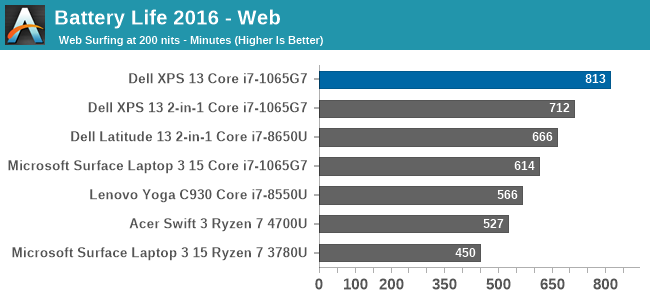
Dell starts out strong with an excellent result on our web battery life test. It managed to achieve over 13.5 hours of runtime on this fairly demanding web workload.
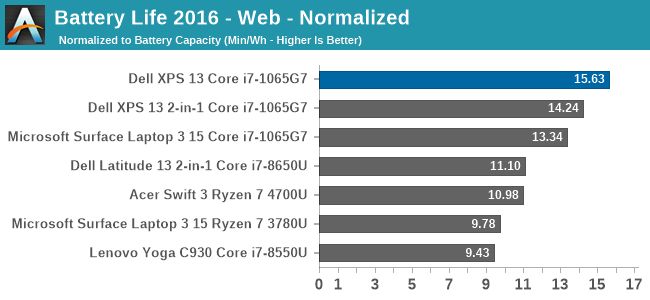
The normalized result removes the battery size from the equation so we can get a clearer picture on overall device efficiency, and we can see why the XPS 13 has lost none of its amazing battery life despite Dell shrinking the battery capacity. Dell continues to lead the field here, at least with the 1920x1200 display that we reviewed. Certainly the higher-resolution, wide-gamut 3840x2400 panel would impact this result significantly.
PCMark 10 Modern Office Battery
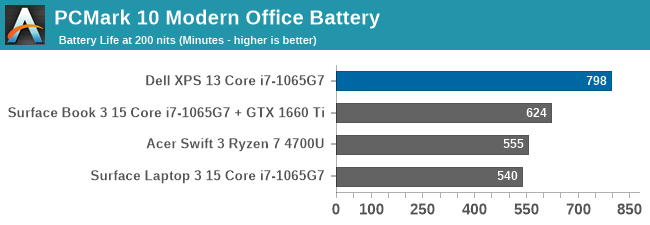
A new benchmark added to the stable is the PCMark 10 Modern Office Battery test, which runs through several common office scenarios on a ten-minute loop. If a device is able to finish the tasks quicker, it gets to idle for a higher percentage of the ten-minute test loop, so efficiency is important, but performance also plays a factor. The XPS 13 once again achieved a very strong result, almost matching the web runtime.
Movie Playback
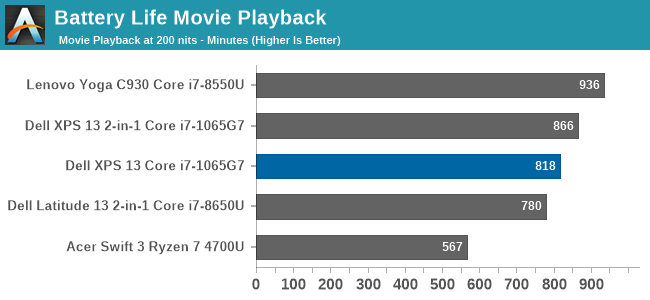
On the movie playback we generally see devices offer even more battery life than the other tests, but the XPS 13 showed such platform efficiency in the previous results that it was not able to extend that much here, but it is still a very strong result.
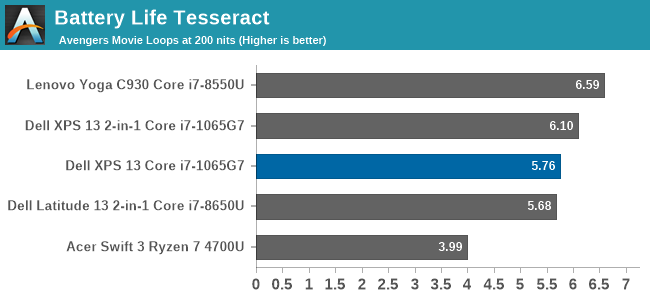
Breaking the movie playback into number of times you can play a very long movie, the XPS 13 almost achieves six complete playbacks of The Avengers before shutting down.
Charge Time
Dell ships a 45-Watt AC adapter with the XPS 13, which charges over a USB-C connector. Since there are Thunderbolt 3 ports on both sides of the notebook, it allows you to charge from whatever side is most convenient, which can help with cable management and is always a nice bonus.
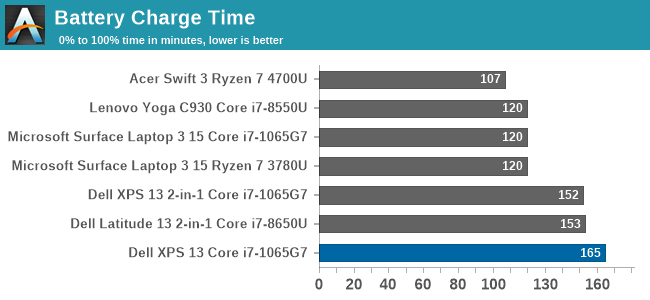
The small charger is plenty to run the notebook, but the charge rate is not spectacular. Luckily, the excellent battery life does mitigate this. Dell does offer an ExpressCharge option which will charge the battery to 80% in one hour and fully charge in two hours, however the user has to specifically choose this if they desire it using the Dell Power Manager software.










224 Comments
View All Comments
Deicidium369 - Friday, July 17, 2020 - link
I agree. OEMs will build what their customers want. I just don't see people clamoring for an AMD over an IntelKorguz - Friday, July 17, 2020 - link
of course you dont, cause you can only see intel, no matter what.vladx - Saturday, July 18, 2020 - link
No we can certainly see AMD with how they fail time and time again to launch reliable products and platforms.Korguz - Saturday, July 18, 2020 - link
seems your god intel seems to be failing quite a lot the last few years.vladx - Saturday, July 18, 2020 - link
Sorry that you're so butthurt that you try to mock others, Intel sells best because they are very reliable unlike AMD.Korguz - Saturday, July 18, 2020 - link
sorry you are butthurt cause your god intel has screwed up so bad the last few years, and that you blind to see anything else.rhysiam - Thursday, July 16, 2020 - link
Oh come on, this cherry picked "17%" claim again? See my post above. The very review you are commenting on shows highly threaded workloads pushing to AMD's advantage in the 34% to 79% range, depending on the specific workload. That is **not** "virtually matching"... and the 4700U is **not** the top Renoir.Deicidium369 - Friday, July 17, 2020 - link
"Summing up the performance metrics, the Intel Core i7-1165G7 has a lead of up to 20% in single-core performance tests while featuring a 10% clock speed advantage over the Ryzen 7 4800U (4.2 GHz vs 4.7 GHz). In multi-core tests, the Ryzen 7 4800U is 17% faster but that is despite the AMD chip having twice the number of cores and threads. But that's the fastest score for the chip with Linux OS which tends to offer higher scores. Compared to a Ryzen 7 4800U on Windows OS, the Core i7-1165G7 leads by up to 35% in single-core while being just 6% slower than its 8 core & 16 thread competitor."https://wccftech.com/intel-10nm-core-i7-1165g7-cpu...
34% higher performance in single core - slightly higher clock, but not 34% higher clocks - that's a nice IPC gain.
Not seeing the 34 to 79% AMD advantage in multicore. I am seeing the multicore being between 17% slower and 6% slower depending on the OS - with 8 cores & 16 threads vs 4 cores and 8 threads.
Just so we are working from the same materials.
Korguz - Friday, July 17, 2020 - link
yea, wccftech is a trust worthy source, arent they mostly a rumor/BS site ?Spunjji - Monday, July 20, 2020 - link
WCCFTech were running with rumours that Zen 2 would hit ~5Ghz for months before it was released, so yeah, I'd say their record isn't particularly reliable.Their comments section is also notoriously full of trolls and jackasses...